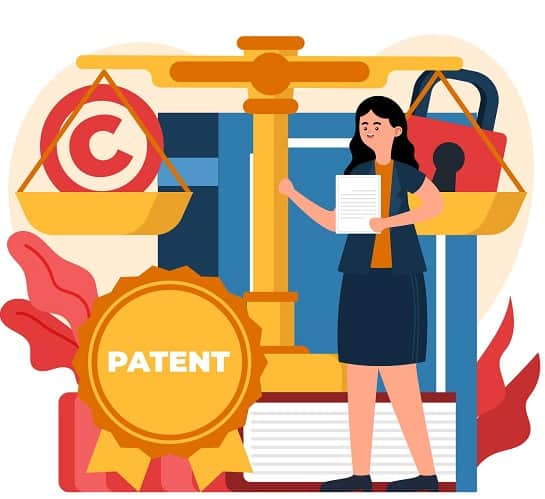Intellectual property is intended to safeguard the creator’s right to any creations of the mind, which includes inventions, literary and artistic works, designs and symbols.
With the rapid digitization in business, art and almost everything, the question of “uniqueness” has been on the table for so long but people failed to fully address it. Now that we can easily put together ideas seeded by the many content we consume online — how sure are we that any idea is really 100% ours?
More importantly, how do you know people aren’t stealing your ideas away for their own profit?
Types of intellectual property and what they’re for
Not all intellectual property is the same and it’s important to know which suits what you need. Some pieces of work require a different clause than the other.
You’ve probably heard some of these formats but to lay down a solid foundation, here they are:
- Patents provide legal protection for inventions, such as processes, machines, food or chemical compositions. They grant exclusive rights to the inventor for a specific period, preventing others from making, using, or selling the patented invention without permission.
- Copyrights safeguard original literary, artistic, musical or dramatic works, including novels, poems, songs, films, paintings and computer software. Copyright grants the creator exclusive rights to reproduce, distribute, and display their work, often for their lifetime plus several years.
- Trademarks protect brands or distinctive signs used to identify goods or services. An IPO trademark can be a logo, slogan, name or combination thereof, which distinguishes a particular product or service from others.
- Trade secrets protect confidential business information, such as formulas, patterns or methods, which provide the owner a competitive advantage.
Why is intellectual property important?
You’ve probably heard stories about rip-offs and people profiting from others’ creative works of art (think piracy).

In today’s highly competitive global marketplace, safeguarding your brand’s creations can do you good in terms of the following aspects:
1. Protects brands and innovation
Branding is more important today for many online businesses — you want to raise brand awareness and take more market share.
To be truly unique and ensure that you only reap the benefits in the end, it’s important to secure exclusive rights to your key brand elements — this is your name, logo, colors, taglines, font, imagery, etc.
This also protects your brand when a copycat makes a bad PR move that could hurt your business.
Also read: 5 Steps for Building your Digital Brand
2. Encourages creativity
More than business application, intellectual property also protects the now thriving creative industry from rip-offs and making profit using their works.
From the fashion, art and music industry, up to the “now at peak” gaming industry, intellectual property rights can even encourage businesses to push for more out-of-the-box concepts and stand out from the crowd.
How do you know people aren’t stealing your ideas away for their own profit?
3. Fosters fair competition
Where businesses are rewarded because of exemplary branding, intellectual property helps even out the competition to some extent. It gives small businesses a jumpstart to having their brand logos and visual elements trademarked.
At the same time, these start-ups can protect their inventions or innovations from big companies that may want to steal their ideas.
What can be registered as intellectual property?
We’ve listed down a few creations that can be registered as intellectual property, ensuring their protection under the law:
- Inventions. This includes a new and useful process, machine, apps or composition of matter, you may be eligible for a patent.
- Creative works. This covers original works of literature, music, art or software that can be copyrighted.
- Brand name and logos. This safeguards your unique brand name, logo, slogan or symbol that distinguishes your products or services from others — ensuring that no one can improperly use and profit from your brand.
- Trade Secrets. This protects confidential information like formulas, practices, processes, designs, instruments, patterns or compilations of information that may be sold or licensed.
To qualify as a trade secret, the information must be:
- Commercially valuable because it is secret
- Known only to a limited group of persons, and
- The rightful holder of the information has taken steps to keep it secret, like using confidentiality agreements for business partners and employees.
How do you register your intellectual property rights?
The process for registering your intellectual property can vary depending on the protection you need.

slogan or symbol that distinguishes your products or services from others.
We shortlisted the general process you need to go through below, giving you an idea of what to anticipate along the way:
- Identify your intellectual property. Define your creation and align it with what kind of protection you need. As a recap, the protection best for you may be patent, copyright, trademark or trade secret.
- Do your research. Do a search and check if your creation can potentially infringe someone else’s right — make sure yours is unique.
- File an application. If you’re sure that your creation is uniquely yours, get the ball rolling and prepare the necessary documents for your application. Then submit it to the Intellectual Property Office (IPO) for processing.
- Approval and renewal. After review, the IPO will let you know if your application is approved and no further revisions will be required. Get legal help for guidance on monitoring and enforcing your intellectual property rights. After the specific period of effectivity, you may then be required to renew.
Protect your intellectual property, protect your business
As a business, intellectual property protection applies to all your brand assets and unique creations — your logo, slogan, product design and innovations. Take the steps to protect them now.

an edge in the future.
It will not only safeguard your creative assets but at the same time, help you leverage them as a profitable income stream.
Use this to help you scale your business and grow your brand in the near future.
More tips on growing your business:
How to Franchise Your Business
How to Start Shipping to Other Countries
How Ninja Van Can Boost Your ECommerce Fulfillment






